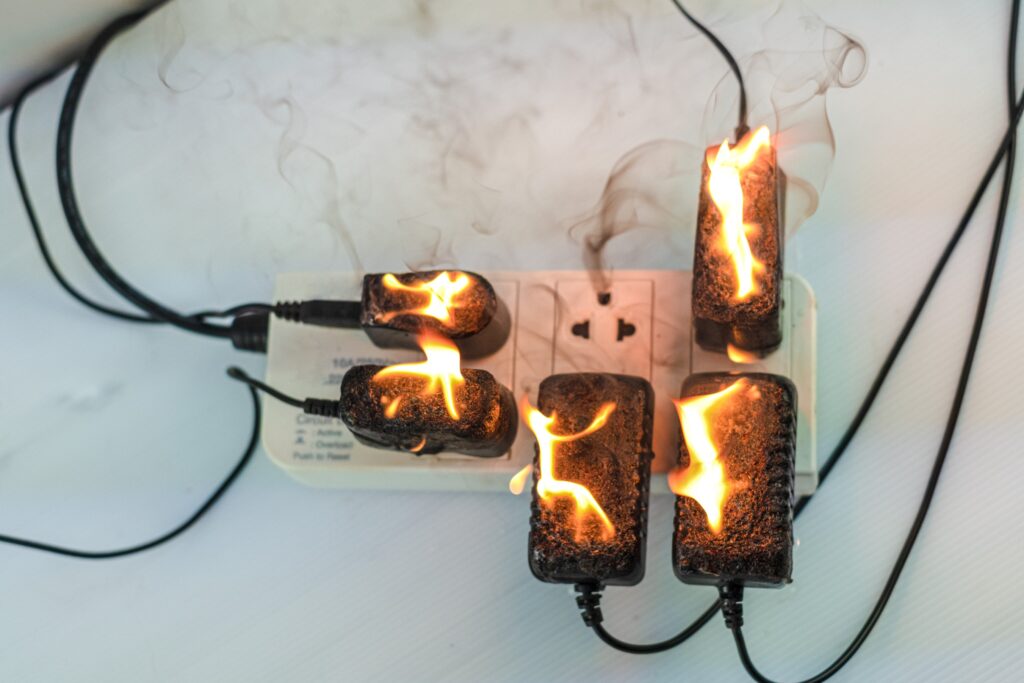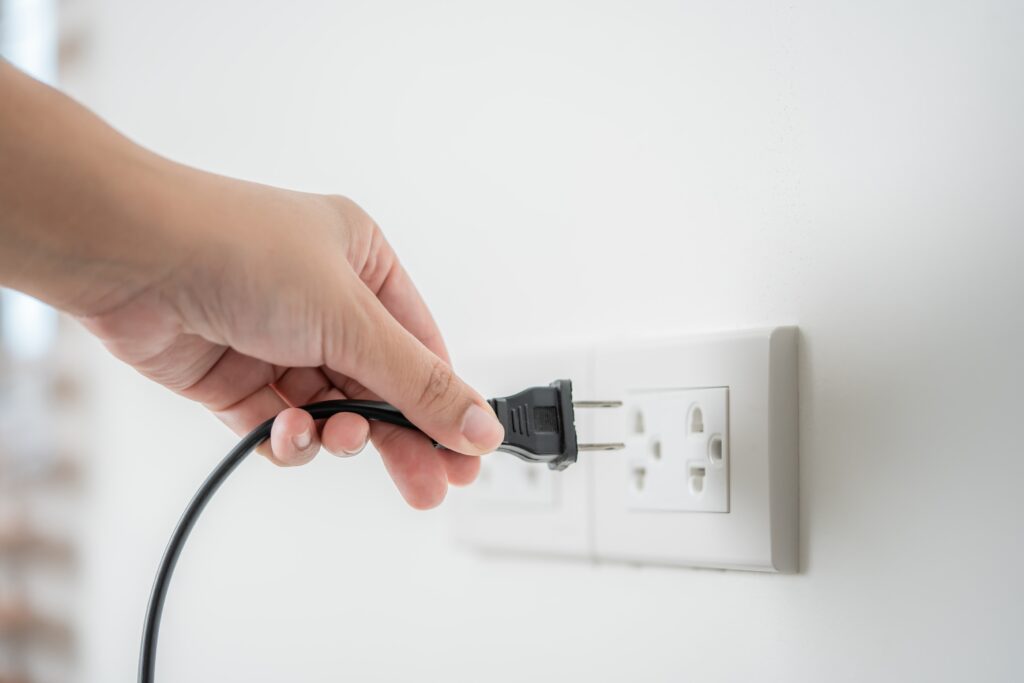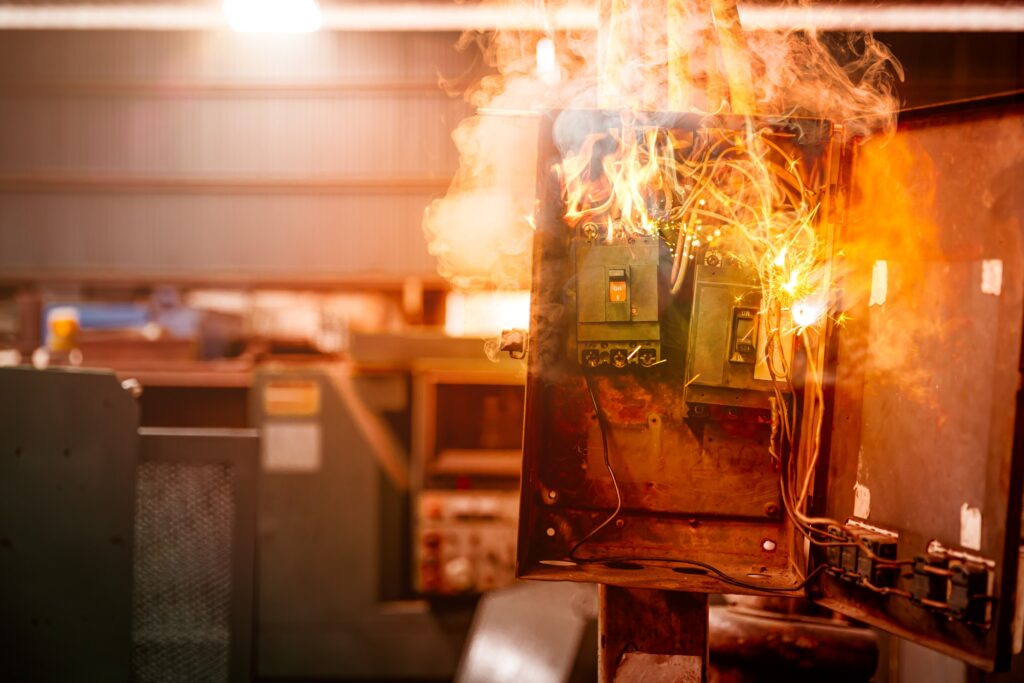Electrical fires are one of the leading causes of home fires in the United States. These fires can result in property damage, injuries, and even death. In 2022, the
US Fire Administration reported that electrical malfunctions were responsible for 26,100 home fires, resulting in 185 deaths, 850 injuries, and $1.49 billion in damages.
Fire safety is crucial to every home, yet many homeowners overlook the dangers associated with electrical fires. In this comprehensive guide, we’ll discuss essential fire safety tips to help you prevent electrical fires and keep your home and family safe.
The Dangers of Electrical Fires
Electrical fires are caused by the malfunction or failure of electrical circuits, equipment, and appliances. When these components overheat or short circuit, they can ignite nearby combustible materials such as furniture, curtains, and other household items. These types of fires can spread quickly and have devastating consequences.
Common Causes of Electrical Fires
- Faulty Wiring: Old or damaged wiring is one of the leading causes of electrical fires. If your home has outdated wiring that cannot handle modern-day electricity demands, it’s time to consider rewiring it.
- Overloaded Circuits: Plugging too many appliances into one outlet or using extension cords can overload the circuit, causing it to overheat and potentially start a fire.
- Misuse of Extension Cords: Using extension cords as a permanent solution for powering appliances is dangerous. Extension cords are not designed for heavy use and can overheat, leading to fires.
- Old or Faulty Appliances: Over time, electrical appliances can deteriorate and become potential fire hazards. Always check for frayed wires, loose connections, and other signs of wear and tear.
- Light Fixtures: Incorrectly installed light fixtures or using bulbs with incorrect wattage can cause fires. Always follow the manufacturer’s instructions and use the correct wattage for your light fixtures.

How to Prevent Electrical Fires
Taking proactive measures to prevent electrical fires is crucial for ensuring the safety of your home and family. Here are some essential tips to keep in mind:
Identifying Potential Hazards
Recognizing electrical hazards in your home is the first step toward prevention. Some common signs to watch for include frayed electrical cords or damaged wires, as exposed wires pose a significant risk and should be repaired immediately. Frequent circuit breaker trips can indicate an overloaded circuit or faulty wiring, while discolored outlets or switch plates may signal overheating or potential fire hazards.
Regularly inspecting your home’s electrical system helps you spot these dangers early and take corrective action.
Conducting a Home Safety Audit
A home safety audit is a thorough evaluation of your electrical system to identify potential hazards. You can either hire a licensed electrician or conduct the audit yourself.
To begin, start at the main circuit breaker panel, ensuring all breakers are correctly labeled and functioning properly. Next, use a receptacle tester to verify that electrical outlets are properly grounded. After doing that, you’ll want to inspect appliances and electronics for any signs of damage and check extension cords for wear (be sure to replace them if needed).
Don’t forget to check light fixtures and switches for overheating or malfunction as well., In the end, be sure to identify any outdated wiring or inadequate electrical systems that might require upgrading.
Regularly Inspect Your Appliances
Overloading your home with too many appliances can increase the risk of an electrical fire. With that being said, regularly inspecting your electrical appliances for any signs of damage, malfunction, or wear and tear is key to preventing electrical fires.
Look out for frayed wires, loose connections, and unusual sounds or smells coming from your electrical appliances. If you notice anything concerning, have a professional inspect and repair them immediately.
Use Extension Cords Safely
Extension cords are meant for temporary use, not as permanent solutions. Avoid overloading extension cords with too many devices, and never run them under carpets or rugs where they can overheat and catch fire. If you need more outlets in a particular area of your home, consider hiring an electrician to install additional outlets.
Upgrade Outdated Wiring
Outdated wiring poses a significant fire hazard, particularly in homes built before the 1970s. If your home has an outdated electrical system or you notice any signs of malfunction, upgrading the wiring to meet modern safety standards is crucial.
Older homes often cannot handle the increasing electricity demands of contemporary appliances and electronics. An electrician can evaluate your home’s wiring and recommend necessary updates or repairs to ensure safety and efficiency.
Installing GFCI
Ground Fault Circuit Interrupters, commonly known as GFCIs, are devices designed to protect people from electrical shock hazards. They work by constantly monitoring the amount of current flowing from hot to neutral. If there is any imbalance, indicating a potential ground fault, the GFCI cuts off the electrical circuit, preventing injury or death.
GFCIs are particularly important in areas where water and electricity may come into contact, such as kitchens, bathrooms, garages, and outdoor outlets. Installing GFCI outlets in these high-risk areas can significantly reduce the chance of electrical shock and enhance overall electrical safety in your home.
Keep Flammable Materials Away From Outlets
Flammable materials like paper, curtains, or furniture should be kept a safe distance away from outlets. If an outlet overheats or malfunctions, these items can easily ignite.
Working Circuit Breakers and Smoke Alarms
Every home should have working circuit breakers and smoke alarms to protect against electrical fires. Circuit breakers are designed to detect overloads and shut off power to prevent fires. Smoke alarms, on the other hand, will alert you in case of a fire so that you can take appropriate action.

Other Safety Measures
- The National Fire Protection Association (NFPA) recommends plugging only one heat-producing appliance (e.g., coffee maker, toaster, space heater) into a receptacle outlet at a time.
- Use light bulbs with the correct wattage for your fixtures to avoid overheating.
- Always unplug small appliances when not in use. Leaving them plugged in can pose a fire hazard.
- Major appliances (e.g., refrigerators, dryers) should be plugged directly into an outlet. Avoid using extension cords or power strips for these items.
- Do not use electrical devices near water sources, such as bathtubs, sinks, or pools.
- If you smell burning or see smoke coming from your electrical system, immediately shut off power and call a licensed electrician.
By following these safety measures and being proactive about electrical safety in your home, you can significantly reduce the risk of an electrical fire. In case of any concerns, always consult a professional for assistance.
Know What To Do in Case of an Electrical Fire
Despite taking precautions, electrical fires can still occur. It is essential to have a plan in place in case of a fire emergency. Make sure everyone in your household knows how to respond and where to find fire extinguishers, fire blankets, and emergency exits.
Most importantly, if an electrical fire occurs in your home, it is crucial to act quickly and safely to minimize damage and protect yourself and your family. Here are the steps you should follow:
- Call 911 Immediately: Contact emergency services right away to report the fire. Provide them with all necessary information and follow their instructions closely.
- Turn Off the Power: If it is safe to do so, turn off the power to the affected area by switching off the circuit breaker or unplugging the device that is on fire. This can help prevent the fire from spreading.
- Use a Fire Extinguisher: If the fire is small and contained, you can use a fire extinguisher to put it out. Ensure you use a Class C fire extinguisher, which is designed for electrical fires.
- Never Use Water: Water conducts electricity and can make an electrical fire worse. Do not use water to try and extinguish the fire, as it poses a risk of electrical shock.
- Employ a Fire Blanket: If a fire extinguisher is not available, or if it is safe to do so, you can use a fire blanket to smother the flames. Fire blankets are made from fire-resistant materials and can quickly extinguish small fires by cutting off the oxygen supply.
- Evacuate the Area: If the fire is not easily controllable, evacuate the area immediately. Ensure all occupants leave the home and stay a safe distance away. Do not re-enter the house until emergency services have declared it safe to do so.
By being prepared and knowing what to do in case of an electrical fire, you can act swiftly to protect your home and loved ones. Remember to regularly check your safety equipment, such as fire extinguishers and fire blankets, to ensure they are in good working condition.

What Not to Do In Case of an Electrical Fire
Electrical fires can be dangerous, and it is crucial to handle them correctly. Here are some things you should NOT do in case of an electrical fire:
- Do Not Use Water: As mentioned earlier, water conducts electricity and can cause electrocution.
- Do Not Touch the Source of the Fire: If a device or outlet is on fire, do not touch it, as doing so could result in an electric shock.
- Do Not Use a Wet Cloth: A wet cloth can also conduct electricity and pose a risk of electrocution. Do not use it to smother flames or try to put out the fire. Instead, use a fire blanket or a Class C fire extinguisher.
- Do Not Try to Put Out Large Fires Yourself: Attempting to put out a large electrical fire yourself can be dangerous. It is best to evacuate the area and wait for emergency services.
- Do Not Panic: Panicking can lead to poor decision-making. Stay calm and follow the steps outlined above.
- Do Not Re-enter the House Until Cleared: Even if you think you have put out a fire, do not re-enter your home until emergency services have declared it safe to do so.
Conclusion
Electrical fires can be devastating and even deadly. However, with proper precautions and awareness, they can be prevented. Stay vigilant about electrical safety in your home by regularly inspecting your wiring and following safety measures.
In case of an emergency, knowing how to respond can save lives and minimize damage. Don’t wait until it’s too late – prioritize the safety of your household today. With these tips, you can ensure a safer home for you and your family.

0 comments